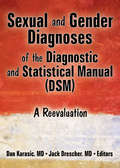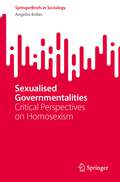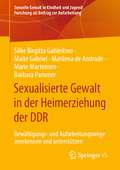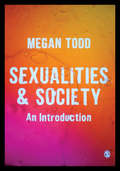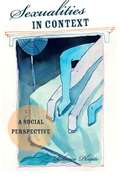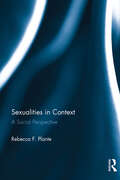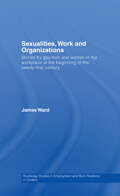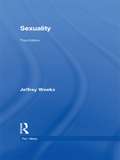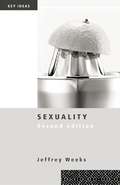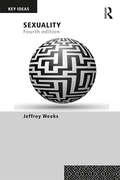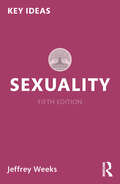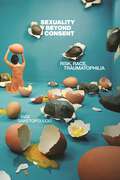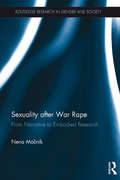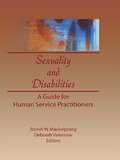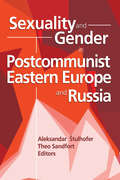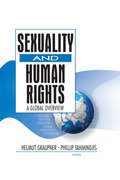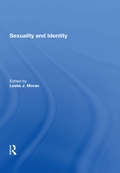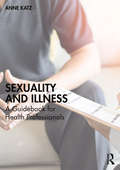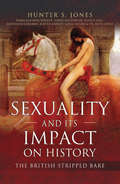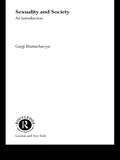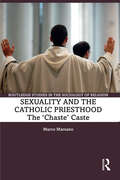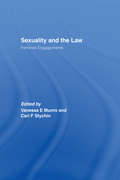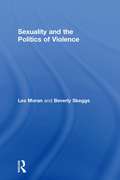- Table View
- List View
Sexual and Gender Diagnoses of the Diagnostic and Statistical Manual (DSM): A Reevaluation
by Jack Drescher Dan KarasicGet the latest on the controversies of the sexual and gender diagnoses contained in the current DSMThe revision of the Diagnostic and Statistical Manual (DSM) is an ongoing process, and changes in criteria or terminology can have significant implications for diagnosis and treatment. Sexual and Gender Diagnoses of the Diagnostic and Statistical Manual (DSM): A Reevaluation provides a range of viewpoints from noted authorities on gender and sexuality issues presently included in the DSM. Arguments for or against revisions of various gender and sexual diagnoses are presented-some may have repercussions regarding insurance reimbursement and patient access to care. This book is certain to raise questions for mental health professionals interested in how cultural influences affect psychiatric diagnoses. Sexual and Gender Diagnoses of the Diagnostic and Statistical Manual (DSM) reviews those controversial gender issues previously seen as being a disorder. The book critically evaluates the medical, psychotherapeutic, and civil rights issues in the diagnosis, assessment, and treatment of GID in children, adolescents, and adults, and presents evidence and debates for its exclusion from the next DSM. Arguments for and against removal of paraphilias from the DSM are explored in detail. Finally, sexual pain criteria for diagnoses are examined, reviewing the latest studies that support or criticize the view that dyspareunia and vaginismus may be better classified as a pain disorder. Sexual and Gender Diagnoses of the Diagnostic and Statistical Manual (DSM) presents controversial debate from experts such as: Robert Spitzer, MD Charles Moser, MD, and Peggy J. Kleinplatz, PhD Walter O. Bockting, PhD, and Randall Ehrbar, PsyD Kelley Winters, PhD Arlene Istar Lev, CSW-R, CASAC Paul Jay Fink, MD and other respected authorities!Sexual and Gender Diagnoses of the Diagnostic and Statistical Manual (DSM) is thought-provoking, enlightening reading for psychiatrists, psychologists, mental health workers, epidemiologists, researchers, educators, and students.
Sexualised Governmentalities: Critical Perspectives on Homosexism (SpringerBriefs in Sociology)
by Angelos BollasThis book critically examines the concept of sexualised governmentalities, a framework for understanding the evolving discourse and power dynamics surrounding discrimination on the basis of sexual practices. Central to this exploration is the shift from traditional heteronormative perspectives to a more complex hetero/homonormative context, where the structure and organisation of sexual relationships gain prominence over the gender or sexual orientation of the participants. A key focus of the book is the concept of homosexism within the realm of gay masculinity studies. The author discusses homosexism as a form of discrimination experienced by gay men from other gay men, highlighting the influence of heteronormative patriarchal society on these interactions. It calls for a broader recognition and acceptance of diverse sexual expressions and challenges the reader to re-evaluate the societal norms around masculinity and sexual behaviour. Sexualised Governmentalities is an important contribution to the discourse on sexual identity and practice, offering insights for a more inclusive and empathetic understanding of sexual diversity.
Sexualisierte Gewalt in der Heimerziehung der DDR: Bewältigungs- und Aufarbeitungswege anerkennen und unterstützen (Sexuelle Gewalt in Kindheit und Jugend: Forschung als Beitrag zur Aufarbeitung)
by Silke Birgitta Gahleitner Maite Gabriel Marilena de Andrade Marie Martensen Barbara PammerSeit April 2019 forscht der Verbund Testimony, gefördert vom Bundesministeriumfür Bildung und Forschung (BMBF), zu sexualisierter Gewalt und traumatischen Erfahrungenin DDR-Heimen aus Sicht der Betroffenen und medizinischen Akteure.Die Kooperation besteht aus der Universität Leipzig, der Alice-Salomon-HochschuleBerlin, der Heinrich-Heine-Universität Düsseldorf und der Medical School Berlin.Das übergreifende Forschungsvorhaben widmet sich eben jener Betroffenengruppe,die bisher noch unzureichend Aufmerksamkeit erfahren hat: ehemaligen Heimkindernaus der DDR, die in den Institutionen sexualisierte Gewalterfahrungen gemachthaben. Zielsetzung des Gesamtprojekts ist eine Aufarbeitung des Geschehenen ausverschiedenen Perspektiven.Das Teilvorhaben der Alice-Salomon-Hochschule Berlin untersucht in diesem Kontextmithilfe von tiefenhermeneutischen biografischen Fallstudien eingehender dieindividuellen Bewältigungswege einzelner Betroffener im Kontext der gesamtgesellschaftlichenAufarbeitung. Im Zentrum des Vorhabens steht, den Betroffenen selbsteine Stimme zu verleihen und in ausführlichen Fallstudien aufzuzeigen, wie sie alsHeimkinder der DDR mit frühen und schweren (sexualisierten) Gewalterfahrungenihren Lebensverlauf bewältigt haben und welche Unterstützungsmöglichkeiten sie alshilfreich empfunden haben. Die Fallstudien werden – partizipativ orientiert – auchals Instrument zur Aufarbeitung eingesetzt und betrachtet. Aus den Fallstudienwerden Schlussfolgerungen gezogen, wie es Betroffenen gelingen kann, trotz allemLebensqualität zu erreichen und zu bewahren und inwiefern soziale, professionelle,gesellschaftliche und politische Unterstützung dabei hilfreich sein kann.
Sexualities and Society: An Introduction
by Megan ToddSexualities and Society adopts a fresh, sociological perspective to explore the development of sexualities across both public and private spheres, giving thoughtful consideration to heterosexualities, cis, bi and trans identities. Divided into three parts, the book starts with an exploration into the history of sexuality, before covering the key theories, and how research into sexualities has been, and could be, conducted. Parts two and three examine how sexualities are framed by cultural factors and social institutions – including the media, religion, and politics – and considers the impact of how significant issues such as identity, age, health and violence relate to sexuality. Employing a range of international case studies, up to date policy developments, and engaging learning features such as ‘discussion points’ and ′fact file′ sections, this book is essential reading for students studying sexuality across sociology, social policy, social care, media, and politics.
Sexualities and Society: An Introduction
by Megan ToddSexualities and Society adopts a fresh, sociological perspective to explore the development of sexualities across both public and private spheres, giving thoughtful consideration to heterosexualities, cis, bi and trans identities. Divided into three parts, the book starts with an exploration into the history of sexuality, before covering the key theories, and how research into sexualities has been, and could be, conducted. Parts two and three examine how sexualities are framed by cultural factors and social institutions – including the media, religion, and politics – and considers the impact of how significant issues such as identity, age, health and violence relate to sexuality. Employing a range of international case studies, up to date policy developments, and engaging learning features such as ‘discussion points’ and ′fact file′ sections, this book is essential reading for students studying sexuality across sociology, social policy, social care, media, and politics.
Sexualities in Context
by Rebecca F. PlanteWritten in an accessible and clear manner, Sexualities in Context presents focused overviews and explorations of some of the most timely issues in the social construction of sex. This brief text is suitable for courses with coverage of gender and sexuality in sociology, psychology, women's and gender studies, and human development. The only book of its kind to address sexualities from a social perspective, Plante's analysis of the context of sexuality, sexual behaviors, and identities is both intelligent and readable. With contemporary topics, such as 'hooking up,' sexual fantasies, and bisexualities, along with examples of how to apply critical thinking, students are empowered to think outside their comfort zones and encouraged to explore the topic of sex in a new context. Employing useful pedagogical features like end-of-chapter questions and suggested projects, this is the ideal text to help students see that sex is not only personal but social and political as well.
Sexualities in Context: A Social Perspective
by Rebecca F. PlanteWritten in an accessible and clear manner, Sexualities in Context presents focused overviews and explorations of some of the most timely issues in the social construction of sex. This brief text is the only book of its kind to address sexualities from a social perspective, Plante's analysis of the context of sexuality, sexual behaviors, and identities is both intelligent and readable. With contemporary topics, such as 'hooking up,' sexual fantasies, and bisexualities, along with examples of how to apply critical thinking, students are empowered to think outside their comfort zones and encouraged to explore the topic of sex in a new context.
Sexualities, Work and Organizations: Stories By Gay Men And Women In The Workplace At The Beginning Of The Twenty-first Century (Routledge Studies In Employment And Work Relations In Contex Ser.)
by James WardSexuality is arguably the most under-researched of all diversity areas in work organizations. This book brings together and relates stories of minority sexual identity from six organizations drawn from three different industry sectors: the Emergency Services, the Civil Service and the Banking sector. Here sexual minorities&nbs
Sexuality
by Jeffrey WeeksFor over twenty years, Sexuality has provided a cutting edge introduction to debates about sexualities, gender, and intimate life. Previous editions included pioneering discussions of the historical shaping of sexuality, identity politics, the rise of fundamentalism, the social impact of AIDS, the influence of the new genetics, ‘global sex’, queer theory, ‘sex wars’, the debates about values, new patterns of intimacy, and much more. In this new edition, Jeffrey Weeks offers a thorough update of these debates, and introduces new concepts and issues. Globalization is now a key way of understanding the reshaping of sexual life, and is discussed in relation to global flows, neo-liberalism, new forms of opposition, cosmopolitanism and the heated debates around sex trafficking and sex tourism. Arguments about the regulation and control of sexuality, and the intersection of various dimensions of power and domination are contextualised by a sustained argument about the importance of agency in remaking sexual and intimate life. In particular, new forms of Lesbian, Gay, Bisexual, Transgender and Queer politics, and the high impact of the debates about same-sex marriage are explored. These controversies, in turn, feed into debates about what is ‘transgressive’, ‘normal’, ‘ordinary’; into the nature of heter-normativity; and into the meanings of diversity and choice. To conclude, the book turns to questions of values and ethics, recognition, sexual citizenship and human sexual rights. This book displays the succinctness, clarity and comprehensiveness for which Jeffrey Weeks has become well known. It will appeal to a wide range of readers internationally.
Sexuality
by Jeffrey WeeksWe are almost programmed into thinking of our sexuality as a wholly natural feature of life. But sexual relations are but one form of social relations, as Jeffrey Weeks makes clear in his book. Drawing on the analyses of Michel Foucault, amongst others, the book examines the social, moral and political issues raised by contemporary forms of sexuality. Weeks provides an authoritative introduction to the sociology of sexuality, discussing its cultural and socio-historical construction, it's relationship with power and the State's involvement in its rationalisation and regulation. This second edition is also updates to include global and postcolonial perspectives on sexuality, queer theory, the internet and cybersex, AIDS as a global phenomenon and international debates on the politics of sexuality. This book is an indispensable introduction to this complex and expanding field.
Sexuality
by Jeffrey WeeksThe new edition of Sexuality displays the qualities which have made this book a key text for understanding human sexuality. Jeffrey Weeks blends deep empirical knowledge with theoretical sophistication and a sensitivity to the politics of sexuality. Framing and shaping the analysis is an acute understanding of the world-wide changes that are remaking sexuality and gender, dramatized by the globalization of sex and the rise and rise of cybersex. These changes have opened unprecedented opportunities for sexual interaction and sexual choice, but also posed new sexual dangers and anxiety. Debates about the regulation and control of sexuality, and the intersection of various dimensions of power and domination are contextualised by a sustained argument about the importance of agency in remaking sexual and intimate life, above all for women and for LGBTQ people. Particular attention is given to the debates about same-sex marriage which symbolize the transformations that have taken place. These controversies in turn feed into debates about intimate citizenship and human sexual rights in a rapidly changing world.
Sexuality (Key Ideas)
by Jeffrey WeeksSexuality is the fifth revised and updated edition of the classic text for understanding human sexuality. This new edition brings the arguments and evidence fully up to date and explores their implication for many topical controversies, around LGBTQ+ rights, the trans experience and gender fluidity, same-sex marriage, sexual autonomy and consent, and the meanings of sexual choice. Since it was first published in the 1980s, Sexuality has been at the cutting edge of the study of the social and historical meanings of sexuality. Blending deep empirical knowledge with theoretical sophistication and an acute sensitivity to the politics of sexuality, the book offers an informed framework for understanding the complexities of sexual life. A key insight of the book is that the ways we think and speak about sexuality make a major contribution to the ways we live it. Sexuality may be rooted in biological possibilities, but it is shaped and experienced through languages and meanings which are inevitably historical and social in nature. The book explores with clarity and precision the invention and re-invention of sexual meanings, the question of what constitutes a true sex and the biological and social roots of sexual difference, the challenges of diversity, the re-making of sexuality as a highly divisive political subject and the implications of the transformation of intimate life in the past few generations. These are seen in the context of profound changes that are re-fashioning the world, especially globalisation, cyber-sex, and the rise of new forms of agency, including among women and LGBTQ+ people, which have fed into new claims for sexual human rights. This new edition of Sexuality will be an indispensable guide for students in the social sciences with an interest in the ever-changing worlds of sexuality.
Sexuality Beyond Consent: Risk, Race, Traumatophilia (Sexual Cultures)
by Avgi SaketopoulouRadical alternatives to consent and traumaArguing that we have become culturally obsessed with healing trauma, Sexuality Beyond Consent calls attention to what traumatized subjects do with their pain. The erotics of racism offers a paradigmatic example of how what is proximal to violation may become an unexpected site of flourishing. Central to the transformational possibilities of trauma is a queer form of consent, limit consent, that is not about guarding the self but about risking experience. Saketopoulou thereby shows why sexualities beyond consent may be worth risking-and how risk can solicit the future.Moving between clinical and cultural case studies, Saketopoulou takes up theatrical and cinematic works such as Slave Play and The Night Porter, to chart how trauma and sexuality join forces to surge through the aesthetic domain. Putting the psychoanalytic theory of Jean Laplanche in conversation with queer of color critique, performance studies, and philosophy, Sexuality Beyond Consent proposes that enduring the strange in ourselves, not to master trauma but to rub up against it, can open us up to encounters with opacity. The book concludes by theorizing currents of sadism that, when pursued ethically, can animate unique forms of interpersonal and social care.
Sexuality Reimagined: MSM in Modern India
by Shailja TandonThe book examines how medical knowledge is produced around bodies that do not fit in the heteronormative framework of the state’s rationale and processes. The marginal bodies studied in this research are termed MSM, men who have sex with men, categorized as a high-risk group in the backdrop of HIV/AIDS. These Queer bodies entered the registers of epidemiology and governmentality. This classification is the point of departure for the book. The book interrogates and asks how does a sexual subject become a political question? To answer this political trajectory, the book analyses the category of risk in biomedicine. It investigates how the category of risk becomes critical to the Indian state’s rationale and policies wherein, through the ambit of health and population, sexuality is managed. Unearthing the sexual politics in South Asia, the book, based on rich empirical evidence derived from the lived experiences of MSM, narrates the construction of sexual subjectivity and masculinity. The process of construction occurs in negotiation with the Indian state, bringing forth the dimension of the Indian state as a medico-legal governmentality regime and how MSM takes on the identity of a medicalized subject.
Sexuality after War Rape: From Narrative to Embodied Research (Routledge Research in Gender and Society)
by Nena MočnikThis book examines the potential impact of rape survivors’ traumatic experiences in post-conflict zones. With specific attention given to the experiences of women who were sexually abused during the breakup of the former Yugoslavia, it addresses the sexuality of survivors, which has so far been inadequately researched, and challenges the stereotypical and victimized images and narrations that have so far prevailed in academic and public discourse about women survivors while exploring the effects of those narratives on the political, social and economic status of the survivors themselves. Methodologically innovative, the book questions the processes of re-victimization that can follow fieldwork with survivors and introduces the theoretical and practical foundations of applied drama and community theater as a research approach in this field, revealing its potential as a means of expressing a range of ethnographic, anthropological and case-study research findings. Based on the narratives of advocates, scholars and different social stakeholders, together with new drama-based methodologies employed directly with survivors, Sexuality after War Rape: From Narrative to Embodied Research offers a sensitive and ethically-responsible research approach to contesting assumptions about the sexualities of survivors of sexual violence and revealing the emancipatory potential of testifying. This book will appeal to scholars of sociology and gender studies, victimology and sexuality.
Sexuality and Disabilities: A Guide for Human Service Practitioners
by Deborah P Valentine Romel W MackelprangIndividuals with disabilities are often “desexualized” in our society, yet they have the same need for intimacy, self-worth, and social belonging as people without disabilities. Sexuality and Disabilities addresses persons with physical, sensory, intellectual, and cognitive disabilities and their concerns in the areas of intimacy, family issues, sexuality, and sexual functioning. It offers suggestions for professionals who work with persons with these disabilities to help them work more competently with disabled persons in the sexuality arena. These concrete ideas are excellent for staff training and education and for enhancing professional development for those working with persons with physical disabilities.The contributing authors create an awareness that all people need individualized consideration and that the special needs of all individuals are important, especially for those who may have previously been left to discover things on their own--usually unsuccessfully. Sexuality and Disabilities focuses on a wide range of disabilities, including physical, developmental, and learning disabilities, mental retardation, and conditions that may have an impact on people later in life such as strokes, heart disease, or other chronic illness. Chapters discuss education and support issues for both practitioners and clients. Some of the topics examined include: components of a staff training program on sexuality and disability specific recommendations for sexuality education and counseling with people with spinal cord injuries and other acquired severe neurological disabilities a program model serving parents with mental retardation and their children specific ways educational programming, social work intervention, and policy efforts can address the special learning needs of people with cognitive impairments sources of support and stress for families caring for developmentally disabled children an analysis of special vulnerabilities and challenges relating to sexual victimization that confront people with disabilitiesAn extremely helpful tool for human service practitioners, Sexuality and Disabilities is also a valuable resource for graduate and undergraduate students who have an interest in working with people with physical, cognitive, or mental disabilities and helping them explore this basic facet of their lives.
Sexuality and Gender in Postcommunist Eastern Europe and Russia
by Edmond J Coleman Theo SandfortImportant new findings on sex and gender in the former Soviet Bloc! Sexuality and Gender in Postcommunist Eastern Europe and Russia is a groundbreaking look at the new sexual reality in Central, Eastern, and Southeast Europe after the fall of communism. The book presents the kind of candid discussion of sexual identities, sexual politics, and gender arrangements that was often censored and rarely discussed openly before the breakup of the Soviet Union in 1987. Authors from a variety of disciplines examine how the changes caused by rapid economic and social transformation have affected human sexuality and if those changes can generate the social tolerance necessary to produce a well-rooted democracy. The first theoretical and empirical body of work to sexuality in (post)transitional countries, Sexuality and Gender in Postcommunist Eastern Europe and Russia examines the effects of the profound social transformation taking place in the former Soviet Union. Through an interdisciplinary perspective, the book addresses vital issues of this transformation, including gender relations, gender roles and sex norms in transition, sexual representations in the media, patterns of adult sexual behavior, gay and lesbian issues, sex trafficking, health risks, and sex education. The book also presents a critical examination of whether the fall of communism has, in fact, induced changes in sexuality and gender relations. Sexuality and Gender in Postcommunist Eastern Europe and Russia examines the changes in sex and gender in countries in transition, including: the negative consequences of Serbia&’s "state-directed non-development" during the 1990s the causes and consequences of trafficking in women from the Russian Federation the ongoing debate over human rights for sexual minorities in Romania the effects of two Yugoslavian films released in the 1990s that feature transgender characters sexualities in transition in Croatia problems created by changes in sexual behavior among urban Russian adolescents the social and legal state of lesbians in Slovenia Sexuality and Gender in Postcommunist Eastern Europe and Russia fills in the gap in the current knowledge and understanding of the effects of the profound social changes taking place in Central, Eastern, and Southeast Europe. The book is an essential read for academics and researchers working in gender studies, political science, and gay and lesbian studies. Handy tables and figures make the information easy to access and understand.
Sexuality and Human Rights: A Global Overview
by Phillip TahmindjisFinally-a comparative overview of sexuality and human rights issues and law!Human rights issues exist globally, particularly when they have to do with sexuality. Sexuality and Human Rights: A Global Overview focuses on the controversial issues of human sexuality and the legal challenges that LGBT individuals face. Internationally recognized legal experts thoroughly discuss the status of important human rights laws pertaining to sexuality from around the world. Reviewing the progression from historical foundations and shifting public opinions through the most recent landmark legal cases, this is an essential resource on the present state of human rights laws and sexuality.This unique, up-to-date examination of the legal issues involving LGBT individuals&’ rights around the world reviews the latest rulings, such as the adoption of minors by homosexual or bisexual parents, the legal acceptance of marriage between same-sex couples, whether the gender-reassigned can be legally considered their true gender identity, and much, much more. Sexuality and Human Rights: A Global Overview illustrates the journey our worldwide legal systems have traveled, and the path stretching before them, until the destination of equality and acceptance in sexuality may finally be reached. Well-referenced, comprehensive, and yet accessible to the general reader, this book provides a crucial, provocative look at just what basic sexual human rights means in today&’s laws.Some of the topics of Sexuality and Human Rights: A Global Overview include: perspectives and objectives to challenge discrimination sexuality and international human rights law sexuality and human rights in Australian law transsexuals issues in European human rights law sexual orientation and gender identity legal issues in North America the present state of sexuality and human rights in European law the Asian legal perspective on sexuality and human rights laws pertaining to sexual identity issuesSexuality and Human Rights: A Global Overview is a vital reference source for law educators, law students, gay rights activists, and law reformers.
Sexuality and Identity (The\international Library Of Essays In Law And Society)
by Leslie J. MoranBorn in the late nineteenth century, sexuality is a relatively new category within the human sciences in general and law and society scholarship in particular. Despite its novelty, it is now a central category through which we understand ourselves both as individuals and as members of communities. This volume offers a collection of essays selected to reflect the ever-widening horizons and diverse methodologies of law and society scholarship on sexual and identity in law. The essays offer an insight into some of the key themes and recent developments in this body of work. Each in different ways offers an evaluation of the nature, meaning and effects of sexuality thereby providing a critical evaluation of the politics of sexual identity as it appears in and through the law.
Sexuality and Illness: A Guidebook for Health Professionals
by Anne KatzThis evidence-based guide educates and informs health professionals about promoting sexual wellbeing in the context of challenges from physical and mental health. Sexuality is an important aspect of quality of life for many people but can be affected by a wide variety of health conditions, such as cardiovascular disease, mental illness, menopause, diseases of ageing, neurological diseases and spinal cord injuries, combat injuries, and cancer. Building readers’ confidence in initiating and encouraging open communication on this often-neglected topic, Sexuality and Illness includes case studies that illustrate how to talk about sexuality and support patients with concerns about it. Making recommendations for practice and further reading, it takes into account gender, sexual, race and ethnic diversity. This accessible text demystifies a topic that is sometimes difficult to discuss. It is essential reading for healthcare practitioners interested in providing comprehensive and person-centred care.
Sexuality and Its Impact on History: The British Stripped Bare
by Hunter S. Jones&“Tales of Lady Godiva, Medieval love traditions, shocking tales from the Tudor court and prostitution during the Victorian era . . . highly addictive.&”—Chicks, Rogues and Scandals Would you swig a magic potion or plot to kill your husband in order to marry your lover? These are just two of the many romantic and sexual customs from British history that you will explore as eight authors take us through the centuries, revealing that truth is stranger than fiction when it comes to love. From bizarre trivia about courtly love, to techniques and prostitution, you&’ll encounter memorable nuggets of provocative information that you&’ll want to share. It's all here: ménage a trois, chastity belts, Tudor fallacies, royal love and infidelity, marriage contracts (which were more like business arrangements), brothels, kept women, and whorehouses. Take a peek at what really happened between the sheets. Each story provides you with shocking detail about what was at the heart of romance throughout British history.Sexuality and Its Impact on History: The British Stripped Bare chronicles the pleasures and perils of the flesh, sharing secrets from the days of the Anglo-Saxons, medieval courtly love traditions, diabolical Tudor escapades—including those of Anne Boleyn and Mary Queen of Scots—the Regency, and down to the &“prudish&” Victorian Era. This scholarly yet accessible study brings to light the myriad varieties of British sexual mores. &“A fascinating book by Hunter S Jones, charting the hidden sexual history of Britain.&”—Daily Mail
Sexuality and Society: An Introduction
by Gargi BhattacharyyaIn this broad-ranging introduction to the study of sexuality, Gargi Bhattacharyya guides students through the key theoretical debates in the area from the early history of sexology, through Foucault's technologies of self to Judith Butler on the performance of identity. Bhattacharyya shows how these theoretical positions apply to sexuality as it is experienced in contemporary society, and covers key topics such as:* the ideology of heterosexuality* sex and the state* sex, race and 'the exotic'* age and sexuality* sex education and pornography.The book argues that the study of sexuality is an essential part of broader debates on gender, race, citizenship and community. Topical and original, it provides a systematic overview of theory combined with up-to-the minute discussion of social and race issues. It gives students a lucid map of the terrain, and an exciting starting point for their own investigations.
Sexuality and the Catholic Priesthood: The 'Chaste' Caste (Routledge Studies in the Sociology of Religion)
by Marco MarzanoBased on interviews with Roman Catholic seminarians, priests and former priests, as well as with managers of seminaries, teaching staff, psychologists and psychiatrists, this book considers the lives of the clergy, beginning with the period before entering the seminary. With attention to both heterosexual and homosexual relationships – and so addressing the tension that exists between Catholic teaching and the reality of clerical lives – this wide-ranging description of seminary life encompasses many issues which are not strictly sexual or emotional, such as time organisation, the importance of study, hierarchical relations and friendship. Showing that the lives of seminarians – and later, priests – are absorbed in balancing the expectations of their role with their need for an emotional life and with maintaining an independent, free inner self, with the result that celibacy can come to be viewed as a pretence to be upheld scrupulously in the public sphere only, Sexuality and the Catholic Priesthood: The 'Chaste' Caste will appeal to scholars of sociology and religious studies with interests in gender and sexuality, the Catholic Church and priestly vocations.
Sexuality and the Law: Feminist Engagements
by Vanessa E Munro Carl F Stychin‘Rediscovering’ the peculiarity of feminist perspectives, rather than examining the broader range of gender-oriented analyses, in the area of legal regulation and sexuality, this edited collection avoids the ‘reductionist' and 'essentialist' shortcomings of ‘feminism unmodified’. With a substantial introductory chapter, written by the editors, summarizing the state of the law on core aspects of sexuality and providing a critical appraisal of the key themes and concerns, it analyzes and transcends the traditional dichotomised thinking (e.g coercion/choice, victim/agent) about the regulation of gender issues. It addresses a broad range of key themes including: crime the family and child contract law jurisprudence public and international law. Offering a space in which to re-vitalize a feminist conception of sexuality, this book is an essential read for law students interested in the legal implications of gender and sexuality.
Sexuality and the Politics of Violence and Safety
by Beverley Skeggs Les MoranSexuality and the Politics of Violence offers a timely and critical exploration of issues of safety and security at the centre of responses to violence. Through a multi-disciplinary analysis, drawing on feminism, lesbian and gay studies, sociology, cultural geography, criminology and critical legal scholarship, the book offers to transform the way we understand and respond to the challenges raised by violence. It breaks new ground in its examination of the rhetoric and politics of violence, property, home, cosmopolitanism and stranger danger in the generation of safety and security. Using interviews, focus groups and surveys with lesbians and gay men, Sexuality and the Politics of Violence draws upon 'real life' experiences of safety and security. It raises some fundamental challenges to the law and order politics of existing scholarship and activism on homophobic hate crime.
